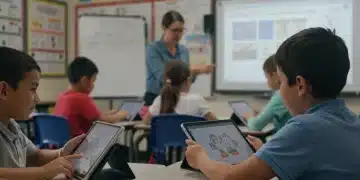Patterns in academic success: 2025 outlook

Patterns in academic success by 2025 will be shaped by technological integration, a focus on mental health, adaptive assessment methods, and an emphasis on lifelong learning to better prepare students for future challenges.
Patterns in academic success are increasingly complex as we approach 2025. Have you ever wondered how these shifts might impact students today? In this article, we’ll unpack the trends that may shape the educational landscape and influence student outcomes.
current trends in academic success
In today’s rapidly changing educational landscape, understanding the current trends in academic success is crucial for students, parents, and educators alike. The ways students achieve and demonstrate success have evolved significantly, influenced by various factors ranging from technology to mental well-being.
Technological Advancements
Technology plays a pivotal role in shaping academic success. With the rise of online learning platforms and educational apps, students now have unprecedented access to resources.
- Interactive learning tools improve engagement.
- Online tutoring options provide personalized education.
- Virtual classrooms allow for greater flexibility and accessibility.
These advances not only foster learning but also help tailor educational experiences to meet individual needs.
Moreover, the incorporation of data analytics into education helps track student progress effectively. Schools and educators can identify areas where students struggle and offer targeted support, improving overall outcomes.
Social and Emotional Learning
Another significant trend is the emphasis on social and emotional learning (SEL). Focus on mental health has gained momentum, recognizing that emotional well-being directly impacts academic performance. Programs that cultivate skills like emotional regulation, empathy, and resilience are becoming common in school curriculums.
By integrating SEL, schools aim to create a more supportive environment conducive to learning. Students who feel emotionally secure are more likely to take academic risks, collaborate with peers, and ultimately achieve their educational goals.
Additionally, parental involvement is being increasingly recognized as a vital component of academic success. Schools are actively fostering partnerships with families to enhance student achievement.
- Workshops for parents on supporting learning at home.
- Regular communication between teachers and families.
- Encouraging family engagement in school activities.
This collaborative approach helps ensure that students receive the support they need both at school and at home, further enhancing their chances of success.
technological influences on education
Technological influences on education are transforming the way students learn and teachers instruct. Today, classrooms are not just places for lectures; they are hubs for interactive learning experiences that engage students effectively.
The Role of Online Learning
Online learning platforms have become essential tools in education. These platforms provide a variety of resources that cater to different learning styles.
- Students can access materials anytime and anywhere.
- They promote self-paced learning that allows for better comprehension.
- Online discussions enable collaboration among peers.
This flexibility allows students to take charge of their education, reinforcing their understanding and skills.
Integration of Interactive Technologies
Incorporating interactive technologies in the classroom enhances student engagement. Tools such as educational apps, smartboards, and virtual reality create immersive learning experiences.
These technologies help students visualize concepts that may be difficult to grasp through traditional methods. For example, virtual reality can transport students to historical events or scientific phenomena, making lessons more impactful.
Additionally, gamification elements added to learning can motivate students to participate actively. Challenges and rewards encourage them to engage with the material in a fun way.
Data Analytics in Education
Another significant aspect is the use of data analytics to improve educational outcomes. Educators can analyze data to understand student performance better.
- Identifying learning gaps enables targeted interventions.
- Predictive analytics helps in anticipating student needs.
- Progress tracking provides valuable feedback for students and teachers.
This data-driven approach ensures that teaching methods are adaptable and aligned with student needs, ultimately enhancing academic success.
impact of socio-economic factors

The impact of socio-economic factors on academic success is significant and multifaceted. These factors shape the resources available to students, influencing their educational experiences and outcomes.
Access to Resources
One major element is access to educational resources. Students from higher socio-economic backgrounds often benefit from:
- Better-funded schools with modern facilities.
- Extracurricular programs that enhance learning.
- Access to technology and internet connectivity.
These resources provide a supportive environment that promotes academic achievement, while students from low-income families may face challenges with basic needs, hindering their focus on studies.
Parental Involvement
Parental involvement plays a critical role in student success and is often affected by socio-economic status. When parents are engaged, students tend to perform better academically. This involvement can include:
- Helping with homework and school projects.
- Attending parent-teacher conferences.
- Encouraging a positive attitude toward education.
However, parents with demanding jobs or limited education might struggle to provide this support, which can affect their children’s academic performance.
The Role of Community Support
Community resources also significantly influence student success. Support systems such as tutoring centers, mentorship programs, and after-school activities can bridge gaps for students in disadvantaged neighborhoods. These programs often aim to:
- Provide homework help and academic support.
- Foster social skills and confidence.
- Encourage goal-setting and motivation.
Such resources empower students to pursue their goals, highlighting the importance of community involvement in education.
role of mental health in achievement
The role of mental health in academic achievement is increasingly recognized as essential. Students’ mental well-being directly impacts their ability to learn and succeed in school. When students are mentally healthy, they are more likely to engage with their studies effectively.
Understanding Mental Health
Mental health includes emotional, psychological, and social well-being. It affects how students think, feel, and act. Good mental health promotes positive interactions with peers, teachers, and family members.
- Students with strong mental health are more resilient.
- They can manage stress better and stay focused.
- It encourages positive behavioral patterns.
Conversely, poor mental health can lead to challenges such as anxiety, depression, and lack of motivation. These issues can hinder academic performance and lead to school dropout.
The Impact of Stress and Anxiety
Stress and anxiety are common among students and can adversely affect their academic outcomes. High levels of stress can make it difficult for students to concentrate on their studies. For instance, students facing academic pressure might experience:
- Difficulty concentrating in class.
- Struggles with homework and assignments.
- Negative impacts on overall well-being.
Addressing these feelings is critical to maintaining a productive learning environment. Schools are beginning to introduce programs focusing on stress relief techniques and coping strategies.
Promoting Positive Mental Health
Schools that prioritize mental health create supportive environments for students. Effective approaches include:
- Implementing social-emotional learning programs.
- Providing access to counseling services.
- Encouraging open discussions about mental health.
By fostering positive mental health, students are better equipped to face academic challenges and maintain motivation. This creates a pathway to not only academic success but also personal growth.
future predictions for 2025
Future predictions for 2025 in education are shaped by evolving trends and technology. As we move forward, schools and classrooms will likely adopt innovative strategies to enhance academic success.
Increased Integration of Technology
By 2025, technology will play an even more significant role in education. More schools are expected to implement:
- Personalized learning experiences using artificial intelligence.
- Advanced virtual and augmented reality tools for immersive learning.
- Data analytics to track student progress in real-time.
These advancements will not only facilitate more engaging lessons but also help teachers tailor their approaches to meet individual student needs.
Focus on Mental Health and Well-being
There will likely be a stronger emphasis on mental health support within schools. Educational institutions are expected to introduce:
- Programs dedicated to promoting emotional intelligence.
- More resources for mental health counseling and support.
- Training for educators to recognize and respond to student mental health needs.
These initiatives can help create an environment where students feel secure and valued, ultimately enhancing their ability to learn.
Shifts in Assessment Practices
Assessment methods may also evolve by 2025. Traditional exams could be replaced or supplemented with:
- Project-based assessments that demonstrate student learning.
- Peer assessments to encourage collaboration and critical thinking.
- Continuous feedback systems allowing for real-time progress tracking.
Such changes are aimed at providing a clearer picture of student understanding and skills, rather than relying solely on standardized tests.
Emphasis on Lifelong Learning
The concept of lifelong learning will continue to gain traction. Education will become a continuous journey, encouraging students to:
- Develop skills for future careers through ongoing training.
- Engage in community learning opportunities.
- Embrace self-directed learning paths.
As the job market evolves, equipping students with tools for lifelong success becomes more critical.
In conclusion, the landscape of education is changing rapidly as we approach 2025. Understanding the patterns in academic success will be crucial for students, educators, and parents. By embracing technological advancements, addressing mental health needs, and preparing for future challenges, we can create a supportive environment that promotes academic achievement for all students. Together, these elements will pave the way for a brighter educational future.
FAQ – Frequently Asked Questions about Patterns in Academic Success
What are the key factors influencing academic success?
Key factors include technological access, mental health support, socio-economic status, and parental involvement.
How does technology affect student learning?
Technology enhances engagement and allows for personalized learning experiences, improving overall academic performance.
Why is mental health important for students?
Good mental health supports focus, resilience, and academic achievement, while poor mental health can hinder performance.
What changes can we expect in education by 2025?
Expect increased technology integration, a focus on mental well-being, adaptive assessments, and a push for lifelong learning.





